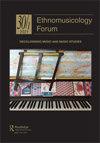维奥莱塔·帕拉:康托拉的音乐和政治遗产
IF 0.5
1区 艺术学
0 MUSIC
引用次数: 0
摘要
摘要本文讨论了维奥莱塔·帕拉作为一名女音乐家的作品,分析了她是如何为挑战智利(和拉丁美洲)音乐中长期存在的殖民主义范式做出贡献的。通过对坎托拉(cantora)或人民女歌手的多方面概念的回顾,以及对四首cueca歌曲的分析,本研究深入了解了帕拉是如何协商她那个时代智利城市民俗场景的条件的。作为一名民俗学家,她的轨迹使她能够证明一种被贬低的流行文化是正确的。作为一名歌手或词曲作者,她重新定义了她那个时代的性别角色,成为同龄人的音乐和政治参照,从而为女性音乐才能和国家身份提供了全新的视角。本文章由计算机程序翻译,如有差异,请以英文原文为准。
Violeta Parra: musical and political legacy of a cantora
ABSTRACT This article discusses Violeta Parra’s work as a woman musician analysing how she contributed to challenging long-standing colonial paradigms in Chilean (and Latin American) music. Through a review of the multifaceted concept of cantora, or female singer of the people, as well as the analysis of four cueca songs, this study offers insights on how Parra negotiated the terms of the Chilean urban folkloric scene of her time. Her trajectory as a folklorist allowed her to vindicate an otherwise disparaged popular culture, and as cantautora, or singer-songwriter, she redefined the gender roles of her time becoming a musical and political referent for her peers, thus offering renovated perspectives on both female musicianship and national identity.
求助全文
通过发布文献求助,成功后即可免费获取论文全文。
去求助
来源期刊

Ethnomusicology Forum
MUSIC-
CiteScore
1.10
自引率
25.00%
发文量
29
期刊介绍:
Articles often emphasise first-hand, sustained engagement with people as music makers, taking the form of ethnographic writing following one or more periods of fieldwork. Typically, ethnographies aim for a broad assessment of the processes and contexts through and within which music is imagined, discussed and made. Ethnography may be synthesised with a variety of analytical, historical and other methodologies, often entering into dialogue with other disciplinary areas such as music psychology, music education, historical musicology, performance studies, critical theory, dance, folklore and linguistics. The field is therefore characterised by its breadth in theory and method, its interdisciplinary nature and its global perspective.
 求助内容:
求助内容: 应助结果提醒方式:
应助结果提醒方式:


